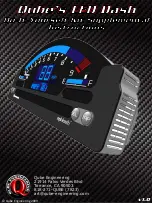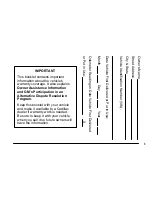
An airbag supplements a correctly fastened seat
belt. It is not a substitute for seat belts. The air-
bag provides additional protection in the corre-
sponding accident situations.
Not all airbags are deployed in an accident. The
various airbag systems work independently of
one another (
Y
page 56).
However, no system available today can com-
pletely eliminate injuries and fatalities.
Due to the required speed of the airbag after
deployment, it is also not possible to entirely
rule out the risk of injuries caused by the airbag.
Important safety notes
G
WARNING
If you deviate from the correct seat position,
the airbag cannot perform its intended pro-
tective function and can even cause addi-
tional injuries when deployed. There is an
increased risk of serious or even fatal injuries.
In order to avoid such risks, always ensure
that all vehicle occupants:
R
fasten their seatbelts correctly, including
pregnant women
R
are seated correctly and maintain the fur-
thest possible distance from the airbags
R
observe the following notes
Always ensure that there are no objects loca-
ted between the airbag and the vehicle occu-
pant.
R
Adjust the seats properly before beginning
your journey. Always make sure that the seat
is in an almost upright position. The centre of
the head restraint must support the head at
about eye level.
R
Move the driver's and front-passenger seats
as far back as possible. The driver's seat posi-
tion must allow the vehicle to be driven safely.
R
Only hold the steering wheel on the outside.
This allows the airbag to be fully deployed.
R
Always lean against the backrest while driv-
ing. Do not lean forwards or lean against the
door or side window. You may otherwise be in
the deployment area of the airbags.
R
Always keep your feet in the footwell in front
of the seat. Do not put your feet on the dash-
board, for example. Your feet may otherwise
be in the deployment area of the airbag.
R
Always secure persons less than 1.50 m tall in
suitable restraint systems. Up to this height,
the seat belt cannot be worn correctly.
If a child is travelling in your vehicle, also
observe the following notes:
R
Always secure children under twelve years of
age and less than 1.50 m tall in suitable child
restraint systems.
R
Child restraint systems should be fitted to the
rear seats.
R
Only secure a child to the front-passenger
seat when the front-passenger front airbag is
disabled, and only then in a rearward-facing
child restraint system. If the PASSENGER AIR
BAG OFF indicator lamp is permanently lit, the
front-passenger front airbag is disabled
(
Y
page 43).
R
Always observe the instructions and safety
notes on the "Automatic front-passenger
front airbag deactivation system"
(
Y
page 50) and on "Children in the vehicle"
(
Y
page 59) in addition to the manufactur-
er's operating and installation instructions for
the child restraint system.
Objects in the vehicle interior may prevent
the airbag from functioning correctly. Before
starting your journey and to avoid risks resulting
from the speed of the airbag as it deploys, make
sure that:
R
there are no people, animals or objects
between the vehicle occupants and an airbag.
R
there are no objects between the seat, door
and B-pillar.
R
no hard objects, e.g. coat hangers, are hang-
ing on the grab handles or coat hooks.
R
no accessories, such as cup holders, are
attached to the vehicle within the deployment
area of an airbag, e.g. to doors, side windows,
rear side trim or side walls.
R
no heavy, sharp-edged or fragile objects are in
the pockets of your clothing. Store such
objects in a suitable place.
G
WARNING
If you modify an airbag cover or affix objects
such as stickers to it, the airbag can no longer
function correctly. There is an increased risk
of injury.
48
Occupant safety
Saf
ety
Summary of Contents for GLC Coupe 2016
Page 2: ......
Page 3: ......
Page 373: ...370 ...
Page 374: ...371 ...
Page 375: ...372 ...
Page 376: ......
Page 377: ......
















































